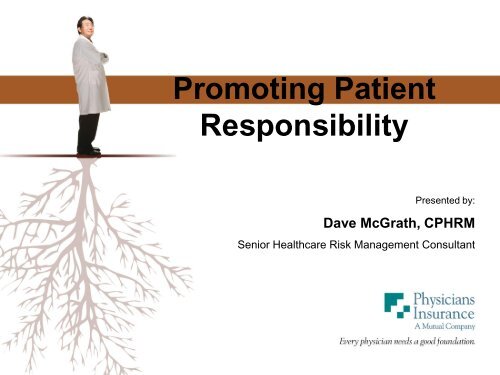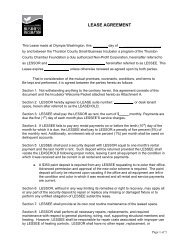Promoting Patient Responsibility - Thurston County Chamber
Promoting Patient Responsibility - Thurston County Chamber
Promoting Patient Responsibility - Thurston County Chamber
You also want an ePaper? Increase the reach of your titles
YUMPU automatically turns print PDFs into web optimized ePapers that Google loves.
<strong>Promoting</strong> <strong>Patient</strong><br />
<strong>Responsibility</strong><br />
Presented by:<br />
Dave McGrath, CPHRM<br />
Senior Healthcare Risk Management Consultant
Today’s program<br />
• <strong>Patient</strong> responsibility / accountability<br />
• Medical records<br />
• Informed Consent<br />
• Adverse events<br />
Physicians Insurance A Mutual Company 2
<strong>Promoting</strong> <strong>Patient</strong><br />
<strong>Responsibility</strong><br />
Communication, documentation,<br />
accountability<br />
Physicians Insurance A Mutual Company 3
Effective healthcare<br />
requires a partnership<br />
between physician and<br />
patient<br />
…but patients often ignore their<br />
end of the bargain!<br />
Physicians Insurance A Mutual Company 4
This can lead to sub-optimal<br />
outcomes that often create patient<br />
dissatisfaction or even set the<br />
stage for malpractice litigation<br />
Physicians Insurance A Mutual Company
The Physician’s Duties<br />
• Examine and evaluate patient<br />
• Arrive at diagnosis<br />
• Inform the patient of diagnosis<br />
• Discuss therapeutic options<br />
• Recommend and agree upon therapeutic course<br />
• Obtain informed consent-(PABRC)<br />
• Discuss and document importance of<br />
recommended follow-up<br />
Physicians Insurance A Mutual Company 6
<strong>Patient</strong>’s Responsibilities<br />
• Provide complete and accurate medical<br />
history<br />
• Submit to necessary diagnostic testing<br />
• Follow agreed upon prescribed course of<br />
treatment<br />
• Return for follow-up as directed<br />
Physicians Insurance A Mutual Company 7
So where are the problems?<br />
<strong>Patient</strong>s often contribute to their health<br />
problems by “non-compliance” with<br />
medical advice regarding:<br />
• Fail to present for diagnostic testing<br />
• No show for important follow-up care<br />
• No show for annual exam<br />
Physicians Insurance A Mutual Company 8
<strong>Patient</strong>s ignore medical advice…<br />
• Missed appointment with specialist<br />
• Fail to monitor blood pressure, glucose,<br />
anticoagulation, etc.<br />
• Fail to notify their physician as worsening<br />
symptoms or health changes occur<br />
• Ignoring recommendations for lifestyle<br />
changes (tobacco-alcohol-diet)<br />
Physicians Insurance A Mutual Company 9
But when problems occur …..<br />
“Why didn't the doctor tell me the importance<br />
of seeing that specialist?”<br />
“I should have been told why that diagnostic<br />
test was so important. I would have had<br />
that test done if I had known…”<br />
Physicians Insurance A Mutual Company 10
Accountability Goals<br />
• Promote active patient participation in<br />
treatment<br />
• Improve patient compliance thereby<br />
improving patient outcomes<br />
• Reduce physician liability exposure<br />
Physicians Insurance A Mutual Company 11
Accountability<br />
• <strong>Patient</strong>s need to be engaged in their care<br />
• Holding patients accountable for their<br />
inaction is often difficult because of poor<br />
communication and a lack of<br />
documentation<br />
Physicians Insurance A Mutual Company 12
Am I responsible for everything?<br />
• Washington State implements the doctrine<br />
of pure comparative fault.<br />
• This means that the “fact finder” (aka jury)<br />
can apportion responsibility to any party in<br />
the case.<br />
• If any responsibility is assigned to the<br />
patient the damage award is reduced by<br />
that percentage<br />
Physicians Insurance A Mutual Company 13
Making the argument…<br />
• The most common barrier to advancing<br />
the comparative negligence argument is a<br />
lack of supporting documentation in the<br />
patient’s chart<br />
• Remember that juries look to the chart as<br />
the unbiased witness in the courtroom<br />
• If it is documented it happened…if it<br />
wasn’t documented…?<br />
Physicians Insurance A Mutual Company 14
Importance of Documentation<br />
• Often the most important evidence<br />
allowing successful defense of a<br />
malpractice claim<br />
• Poor records are the most often sited<br />
reason for settlement<br />
• 35 to 40% of suits are compromised by<br />
the record<br />
Physicians Insurance A Mutual Company 15
Charting Issues in Malpractice<br />
• <strong>Patient</strong> instructions not documented<br />
• Delayed charting<br />
• <strong>Patient</strong> noncompliance not charted<br />
• No documentation of informed consent<br />
and patient education<br />
• <strong>Patient</strong> response to treatment not<br />
charted<br />
• Lack of a treatment plan<br />
Physicians Insurance A Mutual Company 16
Examples of Accountability Tools<br />
• <strong>Patient</strong> Care Agreement Form<br />
• Informed Consent Template<br />
• Refusal of Care Letter<br />
• Lost or Stolen Prescription Attestation<br />
Form<br />
• Agreement for Use of Medication in Pain<br />
Management<br />
Physicians Insurance A Mutual Company 17
Physicians Insurance A Mutual Company 18
Example – Informed Refusal of Care<br />
Physicians Insurance A Mutual Company 21
More Accountability Tools<br />
• Termination of care letter<br />
• Upset patient letter<br />
Physicians Insurance A Mutual Company 22
More Accountability Tools<br />
• <strong>Patient</strong> instruction sheet<br />
– Medication instructions<br />
– Post procedure instructions<br />
– Exercise instructions<br />
– Dietary instructions<br />
Physicians Insurance A Mutual Company 23
Physicians Insurance A Mutual Company 24
Physicians Insurance A Mutual Company 25
Physicians Insurance A Mutual Company<br />
Informed Consent
Informed consent and the law<br />
• Approximately 40% of medical malpractice<br />
lawsuits contain an allegation of “inadequate<br />
consent”<br />
• This is a very effective argument when consent<br />
documentation is absent or inadequate<br />
• Informed consent is necessary patient education<br />
and serves accountability goals<br />
• With good documentation, these claims can be<br />
successfully defended<br />
Physicians Insurance A Mutual Company
<strong>Patient</strong>s and Physicians benefit<br />
• Good consent discussions improve overall<br />
care<br />
• <strong>Patient</strong> satisfaction is higher<br />
• <strong>Patient</strong> compliance is improved<br />
• Better clinical outcomes<br />
• Good consent practices reduce your<br />
liability exposure<br />
Physicians Insurance A Mutual Company
Informed Consent- What is it?<br />
• Informed consent is more than a form, it is a<br />
communication process<br />
• The process begins with a provider’s<br />
recommendation of a treatment plan or<br />
procedure<br />
• All “material facts” relating to the proposed care<br />
are shared with the patient by the provider<br />
• The discussion of material facts is a nondelegable<br />
duty<br />
Physicians Insurance A Mutual Company
What are the “material facts”?<br />
• The nature and character of proposed<br />
treatment<br />
• The anticipated results of proposed<br />
treatment<br />
• The recognized alternative forms of<br />
treatment<br />
• The recognized serious possible risks,<br />
complications, and anticipated benefits<br />
Physicians Insurance A Mutual Company
Physicians Insurance A Mutual Company<br />
Informed Consent<br />
• Procedure-Alternatives-Benefits-Risks-<br />
Complications (PABRC)<br />
• Extent in direct correlation to potential<br />
risks and complications<br />
• Signed procedure specific consent<br />
document for significant procedures<br />
• Consent discussion is mandatory even<br />
when written consent obtained
Physicians Insurance A Mutual Company<br />
Informed refusal<br />
• Based on a P-A-B-R-C discussion patient<br />
elects to forego recommended treatment<br />
• Decision may have significant negative<br />
impact on health and quality of life<br />
• Document P-A-B-R-C discussion and<br />
basis for patient’s decision<br />
• Draft a letter memorializing discussion and<br />
decision
Example – Informed Refusal of Care<br />
Physicians Insurance A Mutual Company
Informed Refusal letter excerpt:<br />
“On (date) you advised me that you do not wish to<br />
undergo this (test/treatment) because (use the reason<br />
patient provided) . During this discussion I expressed<br />
my concerns about your decision and explained to you<br />
the potential consequences of this decision, outlining<br />
what it may mean to your health. To summarize, your<br />
decision to forgo this (test/treatment) could result in,<br />
but is not limited to, the following possibilities: (name<br />
the significant consequences of forgoing care, e.g.,<br />
failure to diagnose a life-threatening illness such as<br />
cancer) . Again, with full knowledge of the potential<br />
consequences of your decision, you have elected to<br />
forgo the (test/treatment) that I have recommended. “<br />
Physicians Insurance A Mutual Company
Physicians Insurance A Mutual Company<br />
Informed Refusal<br />
• Honest communication about the potential<br />
consequence of patient’s decision is important<br />
• Chart documentation is key to memorializing<br />
information provided to patient and patients<br />
decision<br />
• Informed refusal letter designed to reinforce<br />
verbal communication<br />
• Good documentation will insulate from<br />
allegations of inadequate consent process
Terminating Care<br />
Significant non-compliance<br />
can result in dismissal
Common reasons for<br />
Physicians Insurance A Mutual Company<br />
terminating care<br />
• Significant patient non-compliance<br />
• Non-payment / collections<br />
• Violating “no-show” policy<br />
• Verbally abusive or hostile behavior<br />
• Abuse of pain meds/ prescription<br />
alteration<br />
• Threats against staff or physician
Physicians Insurance A Mutual Company<br />
Terminating care<br />
• Remember…you can terminate relationship<br />
for any non-discriminatory reason<br />
• Exceptions are a hospital inpatient, an<br />
unstable patient, late term or high risk<br />
pregnancy, unless a transfer of care has<br />
occurred<br />
• Another exception is patient whose noncompliance<br />
results from a physical or<br />
psychological condition
Terminating the physician-patient<br />
Physicians Insurance A Mutual Company<br />
relationship<br />
• Notify in writing – certified mail<br />
• A specific professional reason is optional<br />
• State clearly the effective date of termination<br />
• Provide resource for locating a new physician<br />
• Offer to transfer records upon receipt of signed<br />
authorization<br />
• Emergency care available for specified time<br />
following termination(unless abusive or<br />
threatening)
Terminating the physician-patient<br />
Physicians Insurance A Mutual Company<br />
relationship<br />
• Letter in patient record<br />
• Chart all patient noncompliance, disruptive<br />
behavior, poor rapport, etc. to support your<br />
termination
Physicians Insurance A Mutual Company<br />
For routine dismissals<br />
• Written notice to patient certified mail return<br />
receipt requested<br />
• Allow 30 days access to care for pending or<br />
urgent medical conditions<br />
• Outline the exact date the relationship ends<br />
• Advise that records will be sent to new<br />
physician upon request<br />
• Provide resource to locate new physician
Before you decide to terminate<br />
Physicians Insurance A Mutual Company<br />
patient<br />
• Is there any discriminatory element to this<br />
decision?<br />
• Is patient stable? Late term/high risk<br />
pregnancy?<br />
• Is non-compliance the result of psychiatric<br />
disorder
When boundaries are crossed<br />
• Threats of physical violence or very<br />
disruptive behavior should be met with<br />
immediate termination<br />
• Abuse of pain medication policies can be a<br />
case by case decision (pain contract?)<br />
• Theft of prescription pads / alteration of<br />
script warrant immediate termination<br />
Physicians Insurance A Mutual Company
When boundaries are crossed<br />
• Immediate termination of care is<br />
permissible depending on circumstance<br />
• No statutes prevent immediate termination<br />
• Document all behaviors/threats/illegal<br />
activity resulting in termination<br />
Physicians Insurance A Mutual Company
Physicians Insurance A Mutual Company<br />
Other considerations<br />
• Notify clinic managers at all ambulatory care<br />
sites within your organization of the dismissal<br />
• Keep a copy of the termination letter on file at<br />
the site<br />
• Set up a “pop up” screen in your computer<br />
system to alert front office if patient tries to<br />
reappoint
Educating <strong>Patient</strong>s<br />
• Providing patients info on practice<br />
policies:<br />
– <strong>Patient</strong> Information brochure/postings<br />
• Services provided by the practice<br />
• Office hours / phone numbers<br />
• After-hours care<br />
• Prescription refill policy<br />
• Missed appointment policy<br />
Physicians Insurance A Mutual Company 47
Setting Limits With <strong>Patient</strong>s<br />
• Educate your staff<br />
– Make sure they communicate practice<br />
policies<br />
– Train staff regarding inappropriate patient<br />
behavior (manipulation, abusive language,<br />
threats, sexual advances)<br />
– Reporting and documenting incidents<br />
– OK to say “No” to patients<br />
Physicians Insurance A Mutual Company 48
Adverse Events<br />
Physicians Insurance A Mutual Company 49
Adverse Events<br />
• Adverse events happen whether the<br />
result of error, known complications to<br />
treatment, or just bad luck<br />
• While significant efforts are taken to avoid<br />
adverse events, they are a part of<br />
medicine<br />
• It is what providers and staff do before<br />
and after an adverse event that largely<br />
determines how the patient will react to<br />
bad news<br />
Physicians Insurance A Mutual Company 50
Setting the Stage<br />
• Good patient rapport: some providers and staff<br />
members are naturals - others must work at it<br />
• Good rapport pays huge dividends especially<br />
when problems in care occur<br />
• Empathetic / honest communications set stage<br />
for good patient - provider relationships<br />
• Rapport building involves everyone from the<br />
front desk to the encounter room to the back<br />
office<br />
Physicians Insurance A Mutual Company 51
The Good News<br />
• <strong>Patient</strong>s generally respond<br />
appropriately to an adverse outcome<br />
if dealt with directly and honestly<br />
• They can understand adverse<br />
events and bad outcomes<br />
Physicians Insurance A Mutual Company 52
Defensiveness is Trouble<br />
• <strong>Patient</strong>s do not understand poor<br />
communication or defensiveness following<br />
an event<br />
• Poor communication or defensiveness can<br />
be perceived as<br />
– A lack of empathy by the provider<br />
– An attempt to cover up an error<br />
– The provider’s interests being placed above<br />
the patient’s needs<br />
Physicians Insurance A Mutual Company 53
Adverse outcome - what now?<br />
• Do not fear your patient<br />
• A sincere demonstration of your<br />
concern and empathy is appropriate<br />
• Be direct and advise patient as soon<br />
as practical<br />
• Outline the basic facts for the<br />
patient (and involved family<br />
members)<br />
Physicians Insurance A Mutual Company 54
Adverse outcome - what now?<br />
• Use language the patient will<br />
understand<br />
• Outline the intended course of action<br />
• Be certain patient understands and is<br />
not left with questions<br />
• Document the discussion, patient<br />
response, and plan of action<br />
• Stick to what is known<br />
Physicians Insurance A Mutual Company 55
Avoid…<br />
• Blaming others / shifting responsibility<br />
• Speculation about cause<br />
• Criticizing colleagues or staff<br />
• Withdrawing from the patient or patient’s<br />
family<br />
• Withholding important information<br />
Physicians Insurance A Mutual Company 56
Apology and the Law<br />
• Can you apologize?<br />
• RCW 5.64.010<br />
– Any statement, affirmation, gesture, or<br />
conduct expressing apology, fault,<br />
sympathy, commiseration, condolence,<br />
compassion, or a general sense of<br />
benevolence, is not admissible as<br />
evidence if:<br />
Physicians Insurance A Mutual Company 57
Apology and the Law<br />
• RCW 5.64.010 (continued)<br />
– Conveyed within<br />
• 30 days of the act or omission or<br />
• 30 days of the provider becoming<br />
aware of the act or omission; and<br />
– Relates to discomfort, pain,<br />
suffering, injury, or death of the<br />
injured person as a result of the<br />
alleged negligence<br />
Physicians Insurance A Mutual Company 58
Law Supports Apology<br />
• Intended to enhance the<br />
patient / provider relationship<br />
• Ethical duties prevail regardless of<br />
30-day time frame<br />
• What to do?<br />
Physicians Insurance A Mutual Company 59
Adverse Event Response<br />
• Document date you are aware of event<br />
• Investigate<br />
• Be timely<br />
• Coordinate with other staff and providers<br />
• Reach out<br />
• Disclose what you know<br />
– Disclosure with empathy<br />
– Disclosure with apology<br />
Physicians Insurance A Mutual Company 60
When Adverse Events Happen<br />
<strong>Patient</strong>s and family need<br />
• Explanation of what happened<br />
• Empathy or apology as appropriate<br />
• Transparency<br />
• Steps taken to prevent recurrences<br />
• Impact on health<br />
• Treatment options<br />
Physicians Insurance A Mutual Company 61
MD to JD – What They Want You to Know<br />
“In my experience, a doctor who<br />
sympathetically tells a family, ‘I am sorry.<br />
Things didn’t go the way we expected.<br />
Here is what happened,…’ often won’t get<br />
sued.”<br />
Lee Goldsmith, MD, JD<br />
Medical Economics April 4, 2008 Doctors who<br />
become lawyers: What they want you to know.<br />
Physicians Insurance A Mutual Company 62
While everyone is on the<br />
full disclosure bandwagon,<br />
sometimes you can go too<br />
far!<br />
Physicians Insurance A Mutual Company 63
“This is gonna hurt like hell”
Thanks!<br />
For more information contact us:<br />
Phone: (206) 343-7300 or (800) 962-1399<br />
(509) 456-5868 or (800) 962-1398<br />
E-mail: risk@phyins.com<br />
Visit us at www.phyins.com





